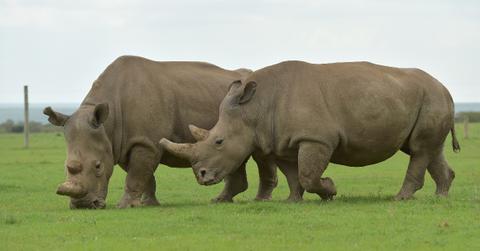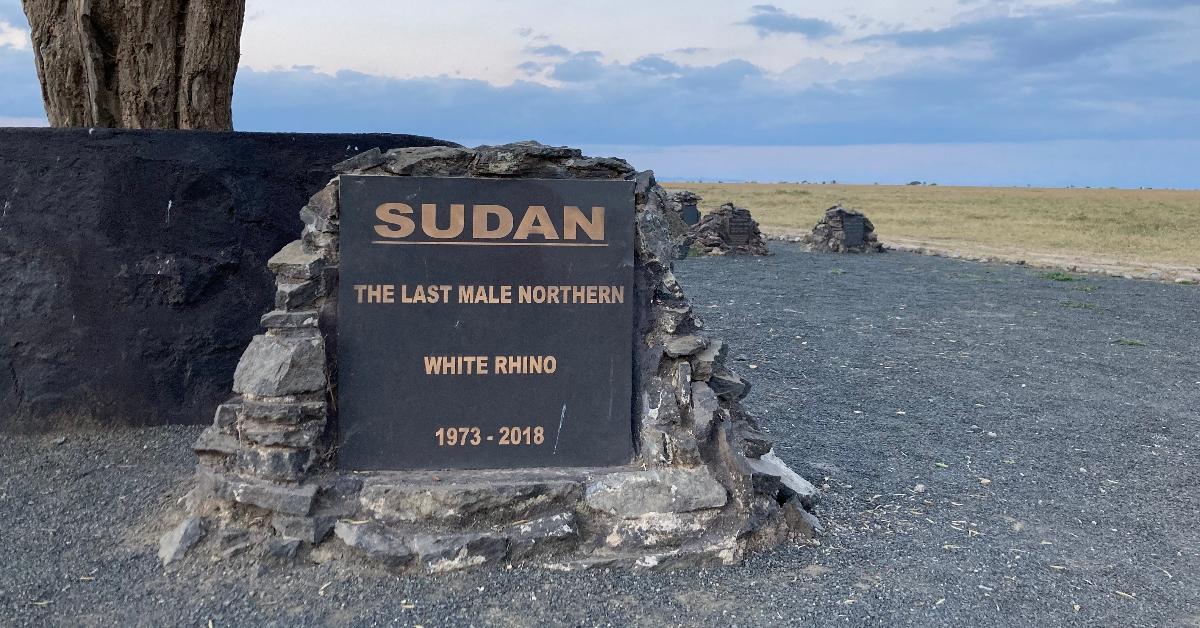Northern White Rhinos Are Functionally Extinct — but IVF Is About to Change That
Published Jan. 24 2024, 2:24 p.m. ET

Najin (L) and Fatu, two of the only remaining female northern white rhino graze together in their paddock on March 20, 2018 at the ol-Pejeta conservancy in Nanyuki, north of capital Nairobi.
The northern white rhino is nearing extinction, with only two infertile female NWRs left on the planet. But science and in vitro fertilization (IVF) could help change that.
Successful IVF procedures in southern white rhinos may hold hope for the future of the northern white rhino, per researchers with BioRescue, a consortium project tasked with preventing the northern white rhino’s extinction. Here are the details of the northern white rhino IVF project.

The world's first rhino embryo has been successfully implanted.
According to BioRescue, a team of 20 scientists from across the globe came together in 2015 to devise a plan to save the near-extinct northern white rhino. Their plan involved the animal’s cousin (the southern white rhino) and IVF.
Scientists were able to successfully transfer two southern white rhino embryos into surrogates in September 2023, The Guardian reported. The pregnancy took, but unfortunately, 70 days into the pregnancy, the surrogate mother rhino and the father died from an “unrelated bacterial infection,” reported The Guardian.
While the experiment ended tragically with the rhino deaths, researchers were still excited that the IVF procedure resulted in a viable pregnancy, since it took more than a dozen attempts to get there, The BBC reported.
“This little baby is the proof of everything,” said Thomas Hildebrandt, head of the BioRescue project, in an interview with The Guardian. “The sperm injection, the fertilization, the liquid nitrogen, the thawing — this was never done before for rhinos. All of it could have failed.”
This IVF treatment could save the northern white rhino.
The plan now is to try the IVF procedure using northern white rhino embryos. In 2008, the northern white rhino breed was officially declared extinct in the wild, per BioRescue. At that time, there were only three northern white rhinos in the world: a male named Sudan and two infertile females, mother and daughter duo Najin and Fatu.
Once found in parts of north central Africa, the northern white rhino population was decimated by poachers during the 1970s, 1980s, and 1990s, per the International Rhino Foundation. The species is now considered “critically endangered,” per Fauna & Flora International.
Sudan, Najin, and Fatu lived at a zoo in the Czech Republic before they were transferred to the Ol Pejeta Conservancy in Kenya in 2009, where they lived under tight security to protect them from poachers.
The outlook for the northern white rhino turned more grim when Sudan, the only remaining male, died in 2018. However, researchers have about 30 embryos preserved in nitrogen that were created with sperm from Sudan and another deceased male northern white rhino and eggs from Najin and Fatu, according to The BBC.
Since neither of the two females can physically carry a fetus to term, scientists plan to implant the embryos in a surrogate southern white rhino, The BBC reports. And they believe it could work, based on the results of the rhino insemination.
"To achieve the first successful embryo transfer in a rhino is a huge step,” scientist Susanne Holtze told The BBC. "But now I think with this achievement, we are very confident that we will be able to create northern white rhinos in the same manner and that we will be able to save the species."